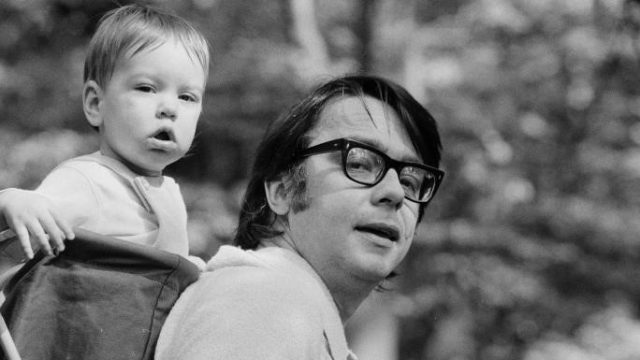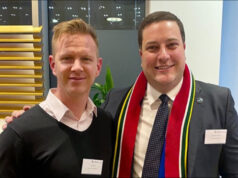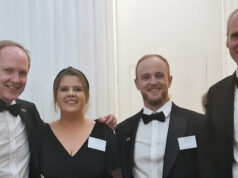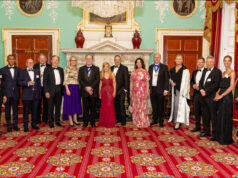Anti-apartheid activist and memoirist betrayed by his best friend and imprisoned in South Africa at the same time as Mandela
January 28 2019, 12:00pm, The Times
by The Rt. Hon Lord Hain
It was Adrian Leftwich, Hugh Lewin’s “dearest friend” and “twin brother”, who betrayed him. The men belonged to a militant anti-apartheid group in South Africa. Leftwich, who was arrested in Cape Town in 1964, broke under interrogation and identified Lewin as a comrade. Five days later the security forces arrested Lewin in Johannesburg.
Leftwich (obituary, May 29, 2013) turned state witness, testified against Lewin at his trial for sabotage and walked free. Lewin was given a seven-year sentence with no chance of remission. After his release, he was exiled for another 21 years.
Lewin, who became an acclaimed author and poet in later life, nursed his anger throughout his incarceration and beyond. “Bitterness . . . clung to me like an armour,” he wrote. Then, in 2002, he read an article that Leftwich, who was by then living in Britain, had written for Granta magazine. It was entitled “I Gave the Names”. It was an honest account of his betrayal in which Leftwich admitted that he had acted out of “terminal terror”. Lewin, by then back in South Africa, was deeply moved. He contacted Leftwich by email. They agreed to meet. On his next visit to Britain he took a train to York and was reunited with Leftwich after 41 years.
“We sit at the river’s edge,” he wrote in his prizewinning memoir, Stones Against the Mirror. “We have met again and found that we are what we were before. Friends. It is better that way.”
Hugh Lewin was born in Lydenburg, a small town east of Pretoria, in 1939. He was the son of an Anglican priest and a missionary, both from England. At the age of eight he was sent to St John’s College, a Johannesburg boarding school, while his mother suffered from mental breakdowns that led to a lobotomy. On Sundays he attended services led by Trevor Huddleston, the anti-apartheid priest, in the township of Sophiatown and wrote about the iniquities of apartheid in the school magazine.
At Rhodes University in Grahamstown he joined an unsuccessful campaign to prevent the government converting Fort Hare, South Africa’s only black university, into a segregated college for Xhosa students only. For this he had his passport confiscated. There followed a marriage, which did not last long, to a fellow activist named Tina.
In the turbulent years after the Sharpeville Massacre of 1960 Lewin worked as a sub-editor for various publications including Drum, the country’s leading black magazine.
In 1962 he joined the underground African Resistance Movement, a small, short-lived group of predominantly young whites who engaged in acts of “protest sabotage” against installations such as pylons and railway signals. “It was the only way we could escape our whiteness,” he wrote. “Apartheid had crippled us. We had grown up in a world of privilege, arbitrarily bestowed on us by the colour of our skin.”
After his arrest two years later he was held in solitary confinement, brutally interrogated and threatened with the death penalty. That November he and three others pleaded guilty to sabotage and — at the age of 25 — he was sent to Pretoria Central Prison. The apartheid system extended even to prisons, with white “political” prisoners held in Pretoria and their black counterparts, such as Nelson Mandela, sent to Robben Island. Lewin described his incarceration as “isolation, few visits, few letters, our days measured by the piles of stinking mailbags we mended, day in, day out, bag after filthy bag”.
The prisoners supported one another. They performed plays, sang hymns the night before the hangings of fellow inmates and wrote poems. Lewin’s most celebrated began: “When I get out / I’m going to ask someone/ to touch me / very gently please/ and slowly/ I want to learn again/ how life feels.”
The poem was inspired by the guards’ treatment of prisoners. “The routine involved being searched three or four times a day,” he explained. “It was horrible. You had to stand there while they slapped and prodded you. It seemed a complete contradiction of touch as a means of connection, something that should be tender and comforting.”
On his release in 1971 Lewin was given a “permanent departure permit” and left South Africa for Britain. He spent the next decade in London, where he met his second wife, Pat, a South African lawyer with whom he had two daughters: Thandi works for South Africa’s department of education, and Tessa works for the Institute of Development Studies in Brighton.
In 1974 he published Bandiet: Seven Years in a South African Prison, an account that he had secretly recorded in tiny handwriting on the pages of his Bible (“bandiet” was what guards called prisoners).
The book was banned in South Africa until the apartheid regime began to crumble in 1989, but it circulated clandestinely and became a classic of its genre. “He writes like a journalist who is a poet. Or should that be the other way around?” Desmond Tutu, the former Archbishop of Cape Town, observed in a foreword.
Lewin also worked for the Defence Aid Fund for Southern Africa, which raised money for families of imprisoned activists.
In 1981 he moved to Zimbabwe to be nearer home. There he trained young journalists and set up Baobab Books, which published gifted young Zimbabwean authors. He also divorced his second wife. Finally returning to Johannesburg in 1992, after the collapse of apartheid, he served on the Truth and Reconciliation Commission, and organised its hearings on human rights abuses in prison and the conduct of the media during apartheid. He and his partner, Fiona Lloyd, a trainer in journalism, lived for a long time on the Thai border with Burma, helping exiled Burmese journalists and former prisoners.
In 2011 Lewin published Stones Against the Mirror, which explored his relations with Leftwich and won the 2012 Alan Paton award. Nadine Gordimer, the South African writer, called it a “fearless exploration into the deepest ground — the personal moral ambiguity of betrayal under brutal interrogation — actual betrayal of the writer by the most trusted associate and closest friend; and the lifetime question of whether one would have betrayed that same friend under such circumstances, oneself.”
Hugh Lewin, activist and author, was born on December 3, 1939. He died from dementia on January 16, 2019, aged 79.










